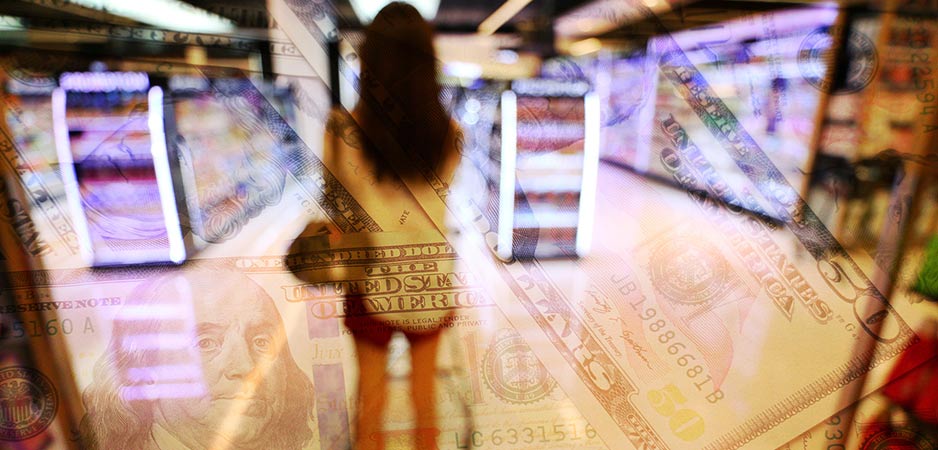The shock to Western civilization produced by the novel coronavirus that causes the COVID-19 disease is only beginning to register. Most commentators have focused on the political and economic dimension of a historical moment unlike any other, in which entire nations across the globe have moved into shutdown mode. Other commentators, such as Andrew Sullivan and Umair Haque, have reflected on how each of us can learn from adopting a lifestyle we are not accustomed to, even temporarily.
How MAGA Sunk the United States
In an op-ed for the advertising industry’s journal AdAge, Lyndsey Fox, the VP of strategy at the agency Allen & Gerritsen, declares that “COVID-19 will change consumerism forever.” She then ups the ante, declaring the closing of an epoch that began in the mid-20th century: “This is why I believe that March 2020 marks the end of consumerism as we’ve come to know it.”
Here is today’s 3D definition for a dictionary of the future:
Consumerism:
A cultural virus that infected the United States massively starting around 1950 and that developed silently over decades without threatening its hosts, until the entire immune system of a population collapsed suddenly in 2020.
Contextual Note
US President Donald Trump is obviously the person most concerned about the fate of the consumer society. After months of promising economic utopia by Easter Sunday at the latest, he has now expressed his new-found pessimism about the damage that COVID-19 may do: “You’re going to have massive depression, meaning mental depression. You’re going to have depression in the economy also. … You’re going to have large numbers of suicides. … But you know what you’re going to have more than anything else? Drug addiction. You will see drugs being used like nobody’s ever used them before. And people are going to be dying all over the place … from drug addiction.”
At a press conference on March 29, Trump cited the trauma for people in the restaurant business who were successful and famous before suddenly discovering that “in one day, they have nothing. They’ve gotten wiped out, one day, from our enemy, this invisible, horrible scourge.” He then added other considerations, such as “anxiety causes … disease.”
His jeremiad was apparently designed as a prelude to his reassuring conclusion that “hopefully we’re not going to have that because hopefully by what we’re doing, we get the best of both worlds.” Having just described in detail the worst of all worlds, the audience may have felt confused about which two worlds he was speaking about. But he clarified that by citing the probability that the number of deaths from the coronavirus in the US will be “much less” than the 2.2 million he mentioned as a possibility. That was the first best: fewer than 2.2 million. The second “best” he expects is that “we get our country running again.” Finally, Trump promised to “bring our economy back strong, just like it was before.”
The way it was before, if he needs reminding, was an inflated consumer economy. This was an economy where close to a majority of the population had been poorly paid for what seemed to be reasonably secure jobs or sources of income. This allowed them to pay for essentials from week to week and, thanks to credit cards, have the supplement they needed to live slightly — or sometimes significantly — beyond their means. The collapse of much of the economy in the wake of the COVID-19 pandemic has put at least a temporary end to that state of affairs. But the long-term consequences are likely to mean that, whatever happens, the economy won’t be “just like it was before.”
Not only are millions of people discovering that they may not be able to pay the rent and buy groceries — with the crunch starting today, the first of April — but the stability they and their creditors counted on may have disappeared. At the same time, their debts are only likely to accumulate. If they survive and the coronavirus permits a return to something approximating a normal lifestyle, just in terms of freedom of movement, they may find that they have definitively lost their status as bona fide members of the consumer society.
Lyndsey Fox describes the traditional role of advertising agencies as “strategic partners in optimization of consumption at all levels.” She then goes on to mention how the current crisis will inevitably reduce the overall level of consumption. The consumer society depended on the idea of stimulating individuals to buy more and more products as they felt the permanent pressure to “keep up with the Joneses.” It was nothing less than the individualism of a society in which everyone felt they were in competition with their neighbors.
According to Fox, American consumers are now discovering something that will have a permanent effect not just on the question of what they consume, but also on why they consume. She sees a change of orientation in the consumer society as people are suddenly discovering that it’s all “about the protection of our communities, the sustainability of our families’ abilities to support ourselves and ultimately the greater good.” Unlike many politicians and economists who expect the hurricane to pass and consumer behavior to return to normal, she anticipates a sea-change in her own marketplace.
Fox sees a shift of focus away from the individualism that has undergirded the consumer society for the past seven decades. Notions such as community and solidarity had been banished from people’s minds as failing to serve the needs of individualistic consumerism and the sacred duty of the political class to guarantee the growth of GDP. The absence of a sense of community endemic to the consumer society produced its immediate effects as the COVID-19 crisis set in: the hoarding of pasta and toilet paper, two emblematically symbolic objects of consumerism.
Fox appears to contradict the basis of her own business, advertising, whose purpose is to encourage consumption. Some may suspect that this is an example of clever branding, for herself and her agency. But she is right for the same reasons that Trump is right to evoke the possibility of apocalyptic reactions to the tanking of the economy. The virtues of community awareness and solidarity she sees as guiding future consumer behavior correlate with the needs of an economy that, once the drama of the coronavirus has passed, will quickly find itself grappling to meet the other impending health crisis: climate change and the survival of a planet diseased by consumerism.
Donning her professional hat, Fox asks this question: “What does this mean for brands? It means that they just got a new competitor from a tertiary category: community.”
She may be right. Individualistic consumerism is discredited and may be on its last legs. Even Trump sees the future of consumerism as focused not on the usual consumer fare but on the consumption of drugs, a powerful means of escaping the pain of failed consumerism, which many feel preferable to the other choice, the ultimate means of escaping the consuming flames: suicide. As Fox indicates, a new form of collaborative consumerism may well have a chance to compete.
Historical Note
We are living a dramatic historical moment in the cycle that began with the Industrial Revolution and blossomed a century and a half later in the form of a glorious consumer society. In the space of two weeks, the entire tenor of political, economic and cultural discourse has changed. In early March, Donald Trump spoke as if he was dealing with a minor annoyance. Now he evokes an apocalyptic vision of US society.
By mid-March, the Democratic Party believed it had succeeded in eliminating the dire threat posed by Vermont Senator Bernie Sanders and his theme of universal health coverage. The party managed to get its troops settled on the prospect of having a “normal” candidate to run against President Trump in the November election — Joe Biden, a man who had played the role of number two presiding over eight tranquil years of consumer society peace following the fright of 2008. By the end of the month, after the coronavirus had begun dictating how and where people were allowed to live, the headline of an article by Keeanga-Yamahtta Taylor in The New Yorker announced, with impeccable logic: “Reality Has Endorsed Bernie Sanders.“
The response to the crisis, Taylor informs us, “removes workers from work and consumers from consumption; no economy can operate under these conditions.” The author might have stated, to be more accurate, that no consumer economy can operate under such conditions.
In a 2019 article in the business magazine Inc.com, Peter Cohan announced that consumer “spending accounts for 70 percent of American economic growth. If that reverses, we’ll be in recession next year.” Cohan wasn’t expecting a pandemic that would confine consumers to their homes and reduce consumption to its bare bones. He was simply attempting to assess the prospects for a recession in a presidential election year. As soon as the response to the coronavirus began in March 2020, every commentator understood that there would be a recession. Cohan’s reminder that consumption is 70% of the US economy indicates the degree of damage that long months of consumer inactivity may inflict, not only on the economy but also on people’s lives.
What we have now is far more than a recession and, though the economic bailout may have some stabilizing effects, it is possibly more than a depression. At least it’s different than a depression because of the effects it will have on people’s minds and behavior. We haven’t begun to see the human consequences. The New Yorker article reminds readers of some basic facts. “For years, the United States has gotten away with persistently chipping away at its weak welfare state by hiding or demonizing the populations most dependent on it,” the author writes. That means that both the infrastructure and the mindset that makes it possible to help people survive and consume simply doesn’t exist.
In other words, uncertainty reigns at a moment when people living in a society structured by consumer debt are instructed to give up all control over their own lives, including movement and interaction with others. It’s not as if they could live it as a prepaid holiday, even if the US government says it will pay part of the bill. “As many as four in five Americans say they live paycheck to paycheck,” Taylor adds. “Forty per cent of Americans say that they cannot cover an unexpected four-hundred-dollar emergency expense.”
With Biden’s commanding lead in the primary race, no commentator believes the fictional scenario that the Democratic Party, suddenly realizing the pertinence of Sanders’ politics, will change course and seek to recruit the senator from Vermont to save the US economy as its presidential nominee in November. Even though serious doubts have arisen about both the electability and the cognitive capacity of Biden, if the Democrats do make a switch, it would more likely be in favor of the governor that some, including Trump, appear to see as the man of the coronavirus moment on the Democratic side: Andrew Cuomo.
In the face of so many contractions and so much uncertainty about how long the lockdown in the US will last, how much chaos it will produce, how many people will die, how much the government’s effort will cost, how it will be accounted for, and how many businesses will survive the drought due to an absence of consumers, Trump’s vision of “mental depression” may prove to be the most realistic assessment of the state of the union.
Referring to individual citizens’ physical health, Taylor affirms, that “the stress of economic uncertainty is corrosive, eating into the capability of the immune system.” Another commentator, Umair Haque, applies the same logic to the entire economic-political-cultural system defined as neoliberal capitalism — a system that has continually pushed the principle of inequality to an extreme and may now be on the verge of collapse. COVID-19 may simply be the trigger revealing that the system has lost whatever immunity it formerly had to the cancer that has already been slowly devouring it from the inside. Here’s how Haque describes it: “The bottom is chewed through, eviscerated, eaten away, depleted — until nothing is left — by the top. The middle therefore buckles and breaks. The top caves in, eventually, along with it.”
Should we think of this collapse, to quote Hamlet, as “a consummation devoutly to be wished?” If the demise of the consumer society can be managed with the community spirit hinted at by Lyndsey Fox, there may be a good reason to think so.
*[In the age of Oscar Wilde and Mark Twain, another American wit, the journalist Ambrose Bierce, produced a series of satirical definitions of commonly used terms, throwing light on their hidden meanings in real discourse. Bierce eventually collected and published them as a book, The Devil’s Dictionary, in 1911. We have shamelessly appropriated his title in the interest of continuing his wholesome pedagogical effort to enlighten generations of readers of the news.]
The views expressed in this article are the author’s own and do not necessarily reflect Fair Observer’s editorial policy.
Support Fair Observer
We rely on your support for our independence, diversity and quality.
For more than 10 years, Fair Observer has been free, fair and independent. No billionaire owns us, no advertisers control us. We are a reader-supported nonprofit. Unlike many other publications, we keep our content free for readers regardless of where they live or whether they can afford to pay. We have no paywalls and no ads.
In the post-truth era of fake news, echo chambers and filter bubbles, we publish a plurality of perspectives from around the world. Anyone can publish with us, but everyone goes through a rigorous editorial process. So, you get fact-checked, well-reasoned content instead of noise.
We publish 2,500+ voices from 90+ countries. We also conduct education and training programs
on subjects ranging from digital media and journalism to writing and critical thinking. This
doesn’t come cheap. Servers, editors, trainers and web developers cost
money.
Please consider supporting us on a regular basis as a recurring donor or a
sustaining member.
Will you support FO’s journalism?
We rely on your support for our independence, diversity and quality.






